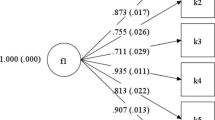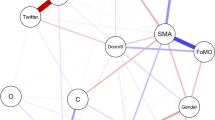Abstract
Based on helplessness/hopelessness theories of depression, the 12-item Coping Competence Questionnaire (CCQ) was designed to assess resilience against helplessness and depression. Evidence from a study involving 2,224 participants indicates that the CCQ is highly reliable, stable over a 1-month period, unidimensional, and internally valid. The CCQ converged negatively with measures of depression, neuroticism, and stress reaction and showed discriminant validity with a variety of other personality constructs. Compared to a measure of attributional style, the CCQ proved to be a superior predictor of depressed mood. Path models support the assumption that the CCQ buffers the effects of stress and negative life events on depressed mood and that dysfunctional coping mediates the effects of coping competence deficits on depression.


Similar content being viewed by others
References
Abramson, L. Y., Dykman, B. M., & Needles, D. J. (1991). Attributional style and theory: Let no one tear them asunder. Psychological Inquiry, 2, 11–13.
Abramson, L. Y., Metalsky, G. I., & Alloy, L. B. (1989). Hopelessness depression: A theory-based subtype of depression. Psychological Review, 96, 358–372.
Abramson, L. Y., Seligman, M. E., & Teasdale, J. D. (1978). Learned helplessness in humans: critique and reformulation. Journal of Abnormal Psychology, 87, 49–74.
Anderson, C. A., & Deuser, W. E. (1991). Science and the reformulated learned-helplessness model of depression. Psychological Inquiry, 2, 14–19.
Barber, J. G., Winefield, A. H., & Mortimer, K. (1986). The personal interests questionnaire: A task-specific measure of locus of control and motivation for use in learned helplessness research. Personality and Individual Differences, 7, 311–318.
Barnett, P. A., & Gotlib, I. H. (1988). Psychosocial functioning and depression: distinguishing among antecedents, concomitants, and consequences. Psychological Bulletin, 104, 97–126.
Beck, A. T., Weissman, A., Lester, D., & Trexler, L. (1974). The measurement of pessimism: The hopelessness scale. Journal of Consulting and Clinical Psychology, 42, 861–865.
Benet-Martinez, V., & John, O. P. (1998). Los Cinco Grandes across cultures and ethnic groups: Multitrait-multimethod analyses of the big five in Spanish and English. Journal of Personality and Social Psychology, 75, 729–750.
Blaney, P. H., Behar, V., & Head, R. (1980). Two measures of depressive cognitions: Their association with depression and with each other. Journal of Abnormal Psychology, 89, 678–682.
Browne, M. W., & Cudeck, R. (1993). Alternative ways of assessing model fit. In K. A. Bollen & J. S. Long (Eds.), Testing structural equation models (pp. 136–162). Beverly Hills, CA: Sage.
Byrne, B. (1998). Structural equation modeling with LISREL, PRELIS, and SIMPLIS: Basic concepts, applications, and programming. Hillsdale, NJ: Psychology Press.
Carver, C. S. (1997). You want to measure coping but your protocol’s too long: consider the brief COPE. International Journal of Behavioral Medicine, 4, 92–100.
Carver, C. S. (2007). COPE. Retrieved April 16, 2012, from http://www.psy.miami.edu/faculty/ccarver/sclCOPEF.html.
Carver, C. S., & Scheier, M. F. (1991). Unresolved issues regarding the meaning and measurement of explanatory style. Psychological Inquiry, 2, 21–24.
Carver, C. S., Scheier, M. F., & Weintraub, J. K. (1989). Assessing coping strategies: A theoretically based approach. Journal of Personality and Social Psychology, 56, 267–283.
Cleary, T. J. (2006). The development and validation of the self-regulation strategy inventory: Self-report. Journal of School Psychology, 44, 307–322.
Colligan, R. C., Offord, K. P., Malinchoc, M., Schulman, P., & Seligman, M. E. P. (1994). CAVEing the MMPI for an optimism-pessimism scale: Seligman’s attributional model and the assessment of explanatory style. Journal of Clinical Psychology, 50, 71–95.
Conerly, R. C., Baker, F., Dye, J., Douglas, C. Y., & Zabora, J. (2002). Measuring depression in African American cancer survivors: The reliability and validity of the Center for Epidemiological Studies Depression (CES-D) scale. Journal of Health Psychology, 7, 107–114.
Coolidge, F. L., Segal, D. L., Hook, J. N., & Stewart, S. (2000). Personality disorders and coping among anxious older adults. Journal of Anxiety Disorders, 14, 157–172.
Cooper, C., Katona, C., & Livingston, G. (2008). Validity and reliability of the brief COPE in carers of people with dementia: The LASER-AD Study. Journal of Nervous and Mental Disease, 196, 838–843.
Coyne, J. C., & Gotlib, I. H. (1983). The role of cognition in depression: A critical appraisal. Psychological Bulletin, 94, 472–505.
Cutrona, C. E. (1983). Causal attributions and perinatal depression. Journal of Abnormal Psychology, 92, 161–172.
DeVellis, B. M., & Blalock, S. J. (1992). Illness attributions and hopelessness depression: The role of hopelessness expectancy. Journal of Abnormal Psychology, 101, 257.
Devins, G. M., Orme, C. M., Costello, C. G., & Binik, Y. M. (1988). Measuring depressive symptoms in illness populations: Psychometric properties of the Center for Epidemiological Studies Depression (CES-D) scale. Psychology & Health, 2, 139–156.
Donovan, D. M., O’Leary, M. R., & Walker, R. D. (1979). Validation of a subjective helplessness measure. Journal of Personality Assessment, 43, 461–467.
Gotlib, I. H. (1991). Explanatory style: A question of balance. Psychological Inquiry, 2, 27–30.
Hammond, W. A., & Romney, D. M. (1995). Cognitive factors contributing to adolescent depression. Journal of Youth and Adolescence, 24, 667–683.
Hann, D., Winter, K., & Jacobsen, P. (1999). Measurement of depressive symptoms in cancer patients: Evaluation of the Center for Epidemiological Studies Depression scale (CES-D). Journal of Psychosomatic Research, 46, 437–443.
Hirsch, J. K., Britton, P. C., & Conner, K. R. (2010). Psychometric evaluation of the Life Orientation Test–Revised in treated opiate dependent individuals. International Journal of Mental Health and Addiction, 8, 423–431.
Hu, L., & Bentler, P. M. (1999). Cutoff criteria for fit indexes in covariance structure analysis: Conventional criteria versus new alternatives. Structural Equation Modeling, 6, 1–55.
John, O. P., Donahue, E. M., & Kentle, R. L. (1991). The Big-Five Intentory: Versions 4a and 54. Berkeley: University of California, Berkeley, Institute of Personality and Social Research.
John, O. P., & Srivastava, S. (1999). The Big Five trait taxonomy: History, measurement, and theoretical perspectives. In L. A. Pervin & O. P. John (Eds.), Handbook of personality: Theory and research (pp. 102–138). New York: Guilford Press.
Joiner, T. E., & Wagner, K. D. (1995). Attribution style and depression in children and adolescents: A meta-analytic review. Clinical Psychology Review, 15, 777–798.
Kline, R. B. (1998). Principles and practice of structural equation modeling. NY: Guilford Press.
Kuhl, J. (1981). Motivational and functional helplessness: The moderating effect of state versus action orientation. Journal of Personality and Social Psychology, 40, 155–170.
Kuhl, J. (1994a). Action versus state orientation: Psychometric properties of the Action Control Scale (ACS-90). In J. Kuhl & J. Beckmann (Eds.), Volition and personality: Action versus state orientation (pp. 47–59). Seattle, WA: Hogrefe & Huber.
Kuhl, J. (1994b). The theory of action and state orientation. In J. Kuhl & J. Beckmann (Eds.), Volition and personality: Action versus state orientation (pp. 9–46). Seattle, WA: Hogrefe & Huber.
Lazarus, A. A., & Folkman, S. (1984). Stress, appraisal, and coping. New York: Springer.
Maybery, D. J., Neale, J., Arentz, A., & Jones-Ellis, J. (2007). The negative event scale: Measuring frequency and intensity of adult hassles. Anxiety, Stress and Coping, 20(2), 163–176.
Ollis, C. L. (2010). The ability of the coping competence questionnaire to predict resilience against learned helplessness among undergraduate college students: An experimental study. Doctoral Dissertation, Utah State University, Logan, UT.
Ollis, C. L., Schroder, K. E. E., & Stein, C. M. (2012). Coping competence as a predictor of response to failure: An experimental study. Manuscript under Review. Department of Psychology. Utah State University. Logan, UT.
Patrick, C. J., Curtin, J. J., & Tellegen, A. (2002). Development and validation of a brief form of the multidimensional personality questionnaire. Psychological Assessment, 14, 150–163.
Peterson, C. (1982). The attributional style questionnaire. Cognitive Therapy and Research, 6, 287–300.
Peterson, C. (1991a). The meaning and measurement of explanatory style. Psychological Inquiry, 2, 1–10.
Peterson, C. (1991b). Further thoughts on explanatory style. Psychological Inquiry, 2, 50–57.
Peterson, C., & Villanova, P. (1988). An expanded attributional style questionnaire. Journal of Abnormal Psychology, 97, 87–89.
Quinless, F. W., & Nelson, M. A. (1988). Development of a measure of learned helplessness. Nursing Research, 37, 11–15.
Radloff, L. S. (1977). The CES-D scale: A self-report depression scale for research in the general population. Applied Psychological Measurement, 1, 385–401.
Sarason, I. G., Johnson, J. H., & Siegel, J. M. (1978). Assessing the impact of life changes: Development of the life experiences survey. Journal of Consulting and Clinical Psychology, 46, 932–946.
Schroder, K. E. E. (1997). Self-regulation competence in coping with chronic disease. Berlin: Waxmann.
Schroder, K. E. E. (2004). Coping competence as a predictor and moderator of depression among chronic disease patients. Journal of Behavioral Medicine, 27, 123–145.
Schroder, K. E. E. (2005). The coping competence questionnaire: Psychometric properties of a new stress resistance measure. Poster presented at the 17th annual convention of the American Psychological Society. Los Angeles, CA.
Schroder, K. E. E. (2012). Helplessness and hopelessness theory revisited: An integrative approach. Birmingham: Department of Health Behavior. University of Alabama at Birmingham.
Seligman, M. E. P. (1975). Helplessness: On depression, development, and death. San Francisco: Freeman.
Spielberger, C. D. (1988). State-trait anger expression inventory, research edition. professional manual. Odessa, FL: Psychological Assessment Resources.
Spielberger, C. D., Jacobs, J., Russell, S., & Crane, R. S. (1983). Assessment of Anger: The State-Trait Anger Scale. In J. N. Butcher & C. D. Spielberger (Eds.), Advances in personality assessment (pp. 161–189). Hillsdale, NJ: Lawrence Erlbaum Associates, Inc.
Spielberger, C. D., Sydeman, S. J., Owen, A. E., & Marsh, B. J. (1999). Measuring anxiety and anger with the State-Trait Anxiety Inventory (STAI) and the State-Trait Anger Expression Inventory (STAXI). In M. E. Maruish (Ed.), The use of psychological testing for treatment planning and outcomes assessment (2nd ed., pp. 993–1021). Mahwah: Lawrence Erlbaum Associates.
Sweeney, P. D., Anderson, K., & Bailey, S. (1986). Attributional style in depression: A meta-analytic review. Journal of Personality and Social Psychology, 50, 974–991.
Tangney, J. P., Baumeister, R. F., & Boone, A. L. (2004). High self-control predicts good adjustment, less pathology, better grades, and interpersonal success. Journal of Personality, 72(2), 271–324.
Tellegen, A. (1982). Brief manual for the multidimensional personality questionnaire. Unpublished Manuscript. Minneapolis: University of Minnesota.
Tennen, H., & Affleck, G. (1991). The meaning and measurement of explanatory style: Unresolved issues. Psychological Inquiry, 2(1), 39–43.
Wichman, A. L., Reich, D. A., & Weary, G. (2006). Perceived likelihood as a measure of optimism and pessimism: Support for the future events scale. Psychological Assessment, 18, 215–219.
Acknowledgments
The authors thank the participants and members of the research team for their contributions to this research.
Author information
Authors and Affiliations
Corresponding author
Rights and permissions
About this article
Cite this article
Schroder, K.E.E., Ollis, C.L. The Coping Competence Questionnaire: A measure of resilience to helplessness and depression. Motiv Emot 37, 286–302 (2013). https://doi.org/10.1007/s11031-012-9311-8
Published:
Issue Date:
DOI: https://doi.org/10.1007/s11031-012-9311-8




